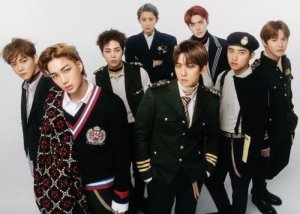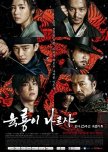Is there any difference? Is there any difference?
I’m asking the world, on deciding life and death
Is there any difference between politics and swords?
These words, from the song “Muiiya,” a Six Flying Dragons OST, emphasize the human cost of both politics and the sword. Six Flying Dragons, as a drama, does the same when it implores the viewer to contemplate the possible outcomes of choice and the effects of those choices on relationships and society as a whole. If anything, Six Flying Dragons attempts to answer this question without limiting the answer toward one argument. As a result, this drama and its writers Park Sang Yeon and Kim Yeong Hyeon effectively communicate the answer to this vital question through the display of its narrative and characterization.
Six Flying Dragons’ narrative ponders the above questions by its creation of characters and actions that test the functions of relationships and its lack of limitation of the characters to a particular faction of good and evil. Characterizations are layered and multi-faceted; for example, Lee Bang Won’s early desire for justice masks a desire for recognition and power. One is surely good, and the other is dangerous, but they both exist within the character. Similarly, in Jeong Do Jeon, one can argue that desire for the people masks desire for recognition and power. Where history tries (and goes back and forth) on the bad/good spectrum of these two characters, Six Flying Dragons delivers realism--the reality, of course, that all humans possess a bug which may swallow them whole. It renders choices, not fate nor relative determinism, as the progenitor of results, effects, and conclusions while maintaining neutrality in its tone.
The narrative achieves this as a whole by offering twists and turns on a grand scale. Tiny, even miniscule character introductions turn into important aspects of character and scene later on; conversations between characters that are seemingly benign hold importance at the right moment. Between betrayals and loyalty, is there any difference? may be the question asked here; the question may also be Between two forms of government, is there any difference? Six Flying Dragons, then, explores these subtexts throughout its frames, urging the viewer to contemplate them as well.
Another way that the narrative urges viewers to explore these notions is through its cinematography. The cinematography of Six Flying Dragons colors and frames the narrative in much the same way that the characterization does. Through use of light, dark, colors (in particular, the deep scarlet of blood), the viewer sees the overt versus the subvert. Overt actions are more splashed in light; subvert or covert actions cloaked in darkness. In doing so, Six Flying Dragons plays on the eyes of the viewer at times, asking us whether the subvert cannot be seen in the overt and vice versa. Between light and dark, is there any difference?
The crispness of character aspect and portrayal not only resides in the narrative, but also in the acting of Six Flying Dragons. With a stellar cast at the outset, one could argue that potential for this drama’s outcome was high, but it would be remiss to leave it at that. The cast of Six Flying Dragons supersedes any previous notion of greatness accorded to it; they crash down the barrier of greatness and replace it with excellence of the highest caliber.
While extending regard to the entire cast of Six Flying Dragons, the focus of the show, and the most compelling character-wise, is its main cast. Yoo Ah In as Lee Bang Won and Kim Myung Min as Jeong Do Jeon bring depth and mindfulness to each of their characters. They allow the viewer to see all aspects of their personality. Yoo Ah In, in particular, plays Lee Bang Won with such nuance that the viewer sees the inner motivations of Bang Won’s heart clearly and sees the influence choices make even in expression and emotion. Kim Myung Min does the same; the viewer sees a man whose concern for the people gets lost a bit in the desire for political recognition. The phrase, “You are the same as me,” is a common and apt theme when it comes to the characters, and in their brilliant acting, one can see how this phrase manifests itself throughout the narrative.
Along with the two protagonists (as I refuse to name either an antagonist), Six Flying Dragons peppers the narrative with great acting. From young men to hardened warriors, Byun Yo Han (Ddang Sae) and Yoon Kyun Sang (Mu Hyul) provide insights from those who are not political but honor bound and how choices made by others affect them. Shin Se Kyung (Boon Yi) ignites a fire and demonstrates the plight of the people in politics--how, between love and loneliness, is there any difference? Jung Yoo Mi (Yeon Hee) shows the importance of standing up for values in light of all other desires. These are just a few of the many great performances Six Flying Dragons introduces into the dramatic world.
As the narrative and action set the drama, music sets the tone. In Six Flying Dragons, the music glorifies an already-rich narrative with lyrical power and earth-jolting strength. This OST is quite simply one of the best. A favorite, surely, is the song “Muiiya,” a song with so much meaning that pervades the narrative and asks the viewer to contemplate its short lyric for far longer than the song. One cannot get enough of the sound of Six Flying Dragons. If I could rate the OST, I would give it a 10, hands down.
Despite its 50 episode length, I need to rewatch this again. There remains much more for me to glean from the drama’s depths, much more for me to contemplate about character, much more for me to study about politics and choices. From someone who could not watch a long drama until last year, I could not get enough. I could go another 20 or 30 episodes if only to see more of this drama’s richness and characterization.
Overall, Six Flying Dragons provides me with the overarching question, Is there any difference between politics and swords? My answer to that question...well, I will let that remain a mystery to the for the new viewer. Instead, I will sit here in the grey, where these questions keep being pondered. Instead, I implore the new viewer to ask themselves these questions while watching and see if they can find a conclusive answer as well.
Was this review helpful to you?























